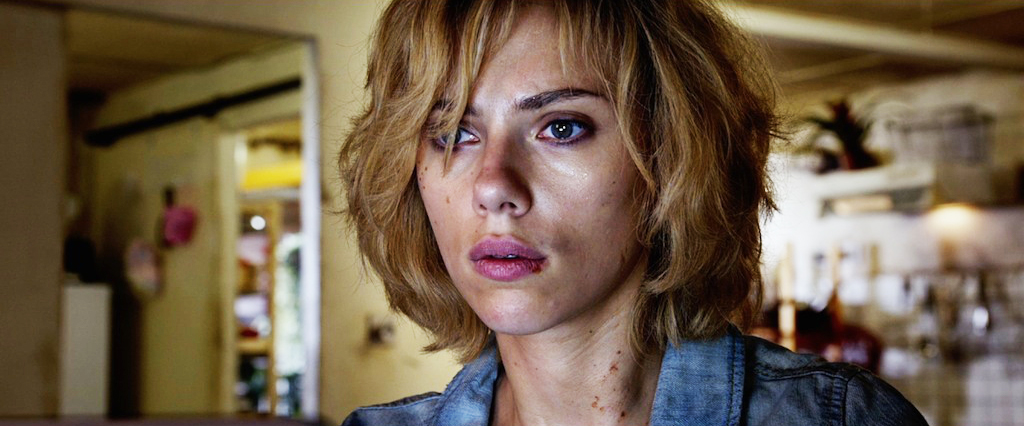Some thoughts on Lucy
Like a lot of things with me these days, the first thing you have to understand about my reaction to Lucy is that I’m old. I’m old enough to have worked at a movie theater in New York when Subway was released, and watched its delirious blend of kinetic cinema, outlandish violence and heartsick romance repeatedly. I’m old enough to have gone to see La Femme Nikita in a movie theater, many times, thrilling to the many ways it was a vast improvement over Subway. I’m old enough to have felt frustrated over the past two decades as director Luc Besson built his gigantic company in France, became a big-budget producer, made computer-animated movies for children and only occasionally made what I’ll call “Luc Besson movies,” that unique blend of kinetic cinema, outlandish violence and heartsick romance that I fell in love with so many years ago. If nothing else, Lucy is a stunning return to form for Besson, at once a thrilling summation and a brilliant leap forward.
Yes, the “science” at the center of Lucy is boneheaded. Yes, we humans use 100% of our cranial capacities all the time. Yes, the marketing of the movie places its bets on the viewer being fascinated by the tantalizing possibilities of the human brain inching its way toward 100% of its potential. If you’re the kind of person who lets bonehead science keep you from enjoying thrillers, you won’t enjoy Lucy. But the “10% of the brain” gag isn’t what Lucy is about.
What Lucy is about is: Scarlett Johansson accidentally ingests a new drug that gives her superpowers. The “10% of your brain” thing is just window dressing, the point is that the protagonist gets superpowers, and they keep getting stronger. The question is not “What happens when the protagonist reaches 100% of her cranial capacity?” but “What are the limits of humanity?”
I’m not going to pretend that Lucy holds any bold new answers to that question, because ultimately the scientific/spiritual breakthroughs in Lucy are just as dopey as “The Fifth Element is Love.” Besson is after a poetic truth, not a scientific one, and not even a very deep one. He’s a pop artist, not a philosopher.
What counts is the quality of the filmmaking, which is astonishing. I got a contact high from Lucy as it put its protagonist through her paces. I see in the trades that the budget of Lucy was $40 million, which I have a hard time believing, except that apparently Luc Besson knows really well how to control a set and handle effects.
The screenplay, in a time when screenplays have begun to bore me with their slavish attention to “the rules,” kept me guessing at every turn. Every time the protagonist thinks she has a handle on what’s happening, the script changes again in wonderful and unpredictable ways. Every time I thought “I see, so now it’s like this,” the screenplay would say “Oh no, it’s not, we’ve got a lot more stuff to show you.” And it does its job without being overly complicated and without ignoring the demands of its genre. It’s a thriller, it’s here to thrill, and it thrills. It deftly juggles all its elements – Asian gangsters, international police, shootouts, action set-pieces, psychedelic brain journey, and then keeps asking the question “What does it all mean?”
As its protagonist hurtles her way toward godhood (it’s kind of like watching the transformation of Dr. Manhattan in slow motion), you start to see – not through dialogue or plot, but through direction and imagery, through inflection and nuance – how she slowly rises above the rest of the characters in the movie, how they’re still trapped in a world of decaying flesh and fossil fuels, of greasy guns and spurting wounds, of the fear of death and the misunderstanding of the nature of time. And then you begin to become aware of your own corruptibility and decay, and your own yearning toward betterment.
I’ve always held that the great tragedy of humanity is that our brains are big enough to suspect that there is more to life than just biology, but not big enough to grasp what that something might be. Lucy, like a cross between The Bourne Identity and 2001, gives grace, charm and pop immediacy to that tragedy. It makes you ache for a sequel, because you want to know how things turn out. Not so much for its protagonist, who seems content by the end, but for the rest of us suckers.

This sounds awesome, and I can hardly wait to see it after reading your thoughts on it. I was previously in the camp of those who thought they’d be too distracted by the boneheaded non-science, but now I super wanna go watch it.
Excited to hear this. I’d been trying to damper my hopes, figuring it might only be as good as, oh, I don’t know, let’s say “From Paris with Love.” But then, Luc did put his name in the title this time.
When she gets to the university is when things really opened up for me. The movie became something more, something bigger. It was all big concepts, semi-spiritual, psychedelic, half science, like watching a Grant Morrison story.
I wanted a whole movie of it. Even though it was all vague cool-sounding jargon, I wanted more explanations from Lucy. I wanted her to explain the entire universe. I wanted that flash drive with the secrets to everything. But I think that was the point all along.
There were moments I was reminded of Enter the Void by Gaspar Noe especially as Lucy sentimentally recalls things to her mother. That was touching I wouldn’t mind a sequel in the vain of Tree of Life or Enter the Void. Which I think is possible even though she’s not there, there are still her memories.